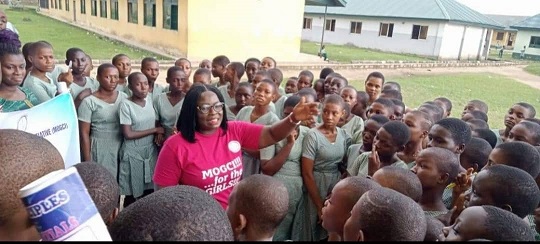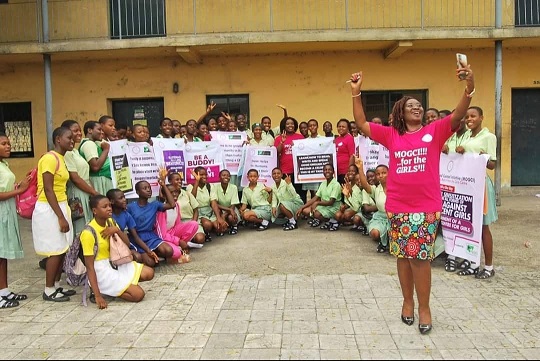IS NIGERIA “INVESTING IN GIRLS’ RIGHTS, THEIR LEADERSHIP, & WELL-BEING?
Writes Lady Doris Onyeneke PhD
A NATIONAL PRESS RELEASE TO MARK 2023 INTERNATIONAL DAY OF THE GIRL.
As Nigeria joins the global community to mark the 2023 Day of the Girl, the question most pertinent to ask across federal, state, and local communities remains, “Is Nigeria “Investing in the girls ’ rights, Their Leadership, and Well-being?”, in the context of 2023 theme of International Day of the Girl.
This leads to more questions about who the Nigerian girl is.
- What is the place of the girl in Nigerian society?
- Does Nigeria as it is currently constituted truly care for and about the Nigerian Girl?
- What is the percentage population of girls in Nigeria?
- Which schools are they attending?
- Are the schools from nursery to secondary safe for the Nigerian girl?
- Which medical health care facilities do girls have access to in Nigeria?
- What percentage of the federal, state, and local government budget is allocated to the needs of the Nigerian girl?

Promoting Girls Rights In Nigeria
According to the United Nations Information, Cultural and Education Fund’s (UNICEF) 2022 data on school enrolment in Nigeria, there are over 13 million Nigerian children currently not attending any form of schooling in Nigeria. Over 60% of this number are girls.
Many do not complete lower-secondary and nearly 50% of those attending any form of schooling risk not completing upper-secondary school due to child marriage, care-giving, and family responsibilities that place huge burden on the girl.
Most girls in Nigerian rural communities and some urban cities have limited access to digital technology and the internet. Many spend several hours every day on unpaid care and domestic work than boys of the same age.
Adolescent girls continue to account for 3 in 4 new HIV infections. Nearly 1 in 4 married/partnered adolescent girls aged 15-19 have experienced physical or sexual violence from an intimate partner at least once in their lifetime.
Sadly, patriarchy and power dynamics afford boys comparative advantages compared to girls in Nigeria. Social and gender norms constrict and restrict girls’ access to public spaces.
Generation after generation, societies continue to socialize girls to be docile and obedient (“good girls”), to be seen not heard, and to obey the status quo. Many are discouraged from being bold, courageous, assertive, and brave enough to know their rights and stand up for same. These socialization processes reinforce gender inequality and marginalization of the girl.
Across the length and breadth of Nigeria, girls are socialized into accepting that their unpaid care work at home and in their families is more valued than their studies in school. With this mindset, we ask on this special day dedicated to the girl, how will Nigerian girls lead businesses and influence policies that affect their well-being?

Empowering Girls to Lead.
Meanwhile, Nigeria is a signatory to several international conventions that promote the rights of the girl, including the 1979 Convention of the Elimination of All Forms of Discrimination against Women (CEDAW), The 1995 Beijing Platform for Action,(BPFA), The 2003 Convention on the Rights of the Child (CRC), domesticated in 25 states of the federation as the Child Rights Act, The Universal Basic Education Act 2003 and the 2000 Millenium Development Goals, that metamorphosed in 2015 to the 17 Sustainable Development Goals (SDGs).
These instruments recommend in unequivocal terms the rights of girls to a quality life, education, and well-being free from all forms of gender based violence, and abuses.
As we celebrate the 2023 International Day of the Girl, the Mother of Good Counsel Initiative (MOGCI) states the following:
- The Nigerian girl has the right to a safe, free, quality and inclusive education,
- The Nigeria Girl has a right to a healthy life, especially, during these critical formative years,
- The Nigerian Girl has a right to reproductive choices.
- The Nigerian girl needs tailored programming to increase her access to sexual and reproductive health services that protect her from abuse.
- Violence negatively affects girls’ general well-being and prevents them from fully participating in society.
To this end, MOGCI calls on governments at all levels in Nigeria to invest in realizing the power and full potential of the Nigerian girl, uphold her rights today, and ensure a more equitable and prosperous future for her.
It is time for all of us to stand accountable, with and for girls, and to invest in a future that believes in their agency, leadership, and potential.
Give girls an opportunity to lead by putting them at the forefront of change efforts; hearing their voices; responding to their asks and welcoming them into decision-making spaces.
Let’s collectively amplify their rights, leadership, and well-being, to inspire the world.
Investment in Girls’ Rights is a Smart Investment.
Lady Doris Onyeneke
Executive Director
###
